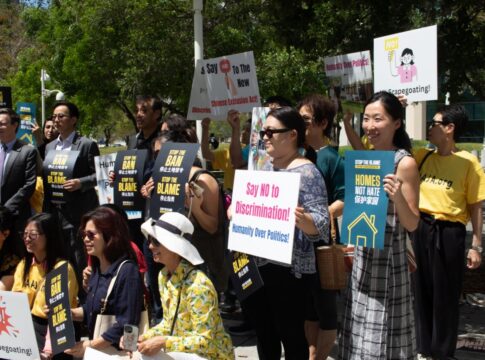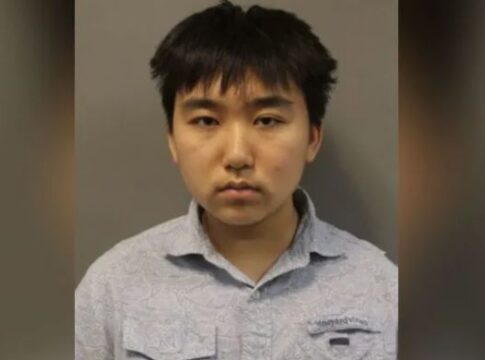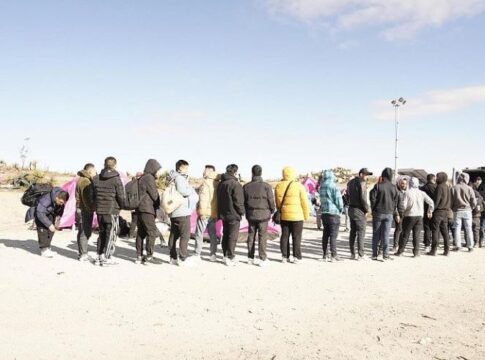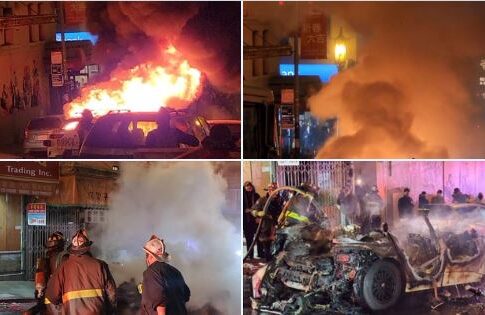Views from the Edge
The three AAPI prospects for President are at critical junctures in their campaigns as they begin to assess the long-term prospects of their candidacies.
Andrew Yang continues to surprise in his run for the Democratic nomination for the Presidency.
Last month his sincere emotional response to a woman who had lost a child to gun violence went viral. Last week, his dance moves went viral.
During a campaign stop in Beaufort, South Carolina, he comfortably stayed in rhytm with a Jazzercise class of women dancing the Cupid Shuffle.
LATEST STORIES
Yang campaign press secretary Randy ones said the candidate heard the music during the campaign stop and decided to walk in and say hello. The class then asked the 2020 presidential hopeful if he would like to join in on their dance. Videos of Yang doing the Cupid Shuffle went viral online, with one video receiving roughly 1.2 million views since being posted Thursday evening.
“As seriously as Andrew and the team take the issues of this country, that’s why he’s running for president,” Jones said, “it’s also important to not take yourself too seriously all the time and have a little bit of fun.”
His dance moves caught the attention of rapper Chance.
Yang responded, “I’d love that.”
The Chinese American’s campaign is considered a long-shot but his candidacy is having an impact in the contest. Several other candidates have caught on to Yang’s issue of automation taking away jobs, America’s future workforce and his push for a Universal Basic Income, or as he calls it, the Freedom Dividend.
He wants to give every adult over 18 $1000 a month. While it is not enough to pull someone out of poverty, he says the money would trickle-up into the economy sustaining jobs by creating consumer demand and businesses .to meet those demands.
Campaigning in New Hampshire Friday, Yang told the crowd at an event hosted by the ACLU,”I’m going to mass pardon everyone who is in jail for nonviolent marijuana-related offenses,” From the beginning of his campaign he was for the legalization of marijuana, an issue that has since been adopted by other candidates.
Even through a critical time in the campaign, Rep. Tulsi Gabbard took time to perform her annual two-week stint with the Hawaii Army National Guard where she holds the rank of Major.
Gabbard is deployed for two weeks to Indonesia, where she’ll participate in joint military exercises with the Indonesian military, according to Townhall. The candidate says she is “grateful to be able to serve our country and the American people in many ways, including as a soldier.”
The Samoan American’s deployment comes at a time that could determine the future of her campaign. “That’s not what this is about,” she said in a statement. “I look forward to joining my fellow soldiers for a joint-training exercise with the Indonesian military, focused on counterterrorism and disaster response.”
Gabbard’s military service is a key factor in her campaign. In her 16 years of serving in the military, she was deployed to Iraq in 2004 and Kuwait in 2008. In almost every response during the two Democratic debates held thus far, she has found a way to mention her service.
She has not yet qualified for the third Democratic debate and polls at 1%. In order to participate, the DNC requires the candidates to poll 2% in four separate polls. Although she has met the funding requirement, she still needs two more polls where she has garnered 2% of support.
Gabbard will return from her National Guard duty on Aug. 25. The deadline to qualify for the September bate is Aug. 28.
Thus far, only nine of the Democratic candidates have qualified for the ABC-hosted debate on Sept. 12 and 13 in Houston. They are former Vice President Joe Biden, Sen. Bernie Sanders, Sen. Elizabeth Warren, Sen. Kamala Harris, Sen. Cory Booker, Sen. Amy Klobuchar, Mayor Pete Buttigieg, former Rep. Beto O’Rourke, and entrepreneur Andrew Yang.
Of the three AAPI candidates, Sen. Kamala Harris has garnered the most support and is ranked in the top six among the Democratic contenders.
Although she has lost some of the bump she received after the first Democratic debate in June when she clashed with frontrunner former Vice President Joe Biden, with the Iowa Caucus less than six months away, Harris received a boost recently from minority voters in that state.
The Indian American senator has won the endorsement of a small but increasingly influential progressive PAC, the Asian and Latino Coalition in Iowa, the first state to launch the Primary system.
“We support her because of the way she communicates and the strong message she sends about the Democratic party,” Asian and Latino Coalition Chair Prakash Kopparapu said after the vote, citing her healthcare plan as one of her strongest points. “All our members think she can win and compete on the debate stage against president Donald Trump. Definitely she has a strong background in law and knows a lot about what to change in order to bring equality.”
Harris met with the group at the State Capitol earlier in the year. “There’s a lot of work we have to do to restore American values and ideals in terms of how we do public policy on so many issues, including immigration,” Harris said to applause from the crowd.
Last year, the PAC raised and spent $24,000. It’s brought in $20,000 so far this year, with a 2019 goal of $50,000. Besides a few big private donations, the money comes from a $25 annual membership fee and the sale of glasses, T-shirts and other branded merchandise. The money pays for such forums, where everyone is welcomed and fed, and supports candidates.
“We’re kind of pushy,” coalition Communications Director Mitch Henry told the Des Moines Register. “Sometimes local parties are not too happy with us.”
Although Latinos and Asians make up less than 10% of Iowa’s residents, they are the fastest-growing population. The coalition was formed in 2015 when Mitch Henry, who is Latino, and Som Baccam, a Laotian immigrant who has lived in Iowa since 1975 and serves as a leader of a local cultural center, met because they felt the state’s Democratic Party wasn’t paying attention to their concerns. Since then, the group has grown from 15 to over 500 members.
The PAC, which recruits younger members who tend to lean Democrat in contrast to their more conservative immigrant parents, is unabashedly pro-choice, pro-same-sex marriage and pro-labor. “We are brown, black, white, gay, straight, male female, union member,” Henry said.
Unlike Primaries, Caucuses require voters to meet and decide who to endorse. As a result, the Caucuses generally attract low voter turnout. Under Iowa’s Caucus system, a small, vocal, aggressive group of people could influence the debate and influence the outcome.
As the first state to endorse their party candidates, candidates hope that a victory in Iowa will establish momentum for the following primaries. Barack Obama’s surprise win over Hillary Clinton in 2008 forced media and voters to pay more attention to the relatively unknown first-term senator from Illinois.
After endorsing the senator from California, the coalition will begin mobilizing voters for the Caucus in February.
“I tell our group constantly, we cannot depend on others for success,” Henry said. “We need to do it on our own. Nor can we blame others for our failures. We live or die by our own capacity That’s why we have this PAC.”
AsAmNews has Asian America in its heart. We’re an all-volunteer effort of dedicated staff and interns. Check out our Twitter feed and Facebook page for more content. Please consider interning, joining our staff or submitting a story.








